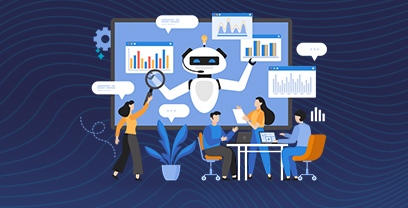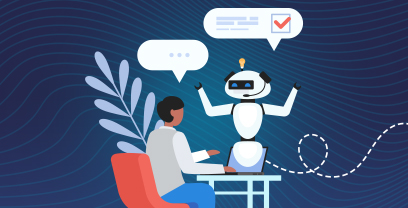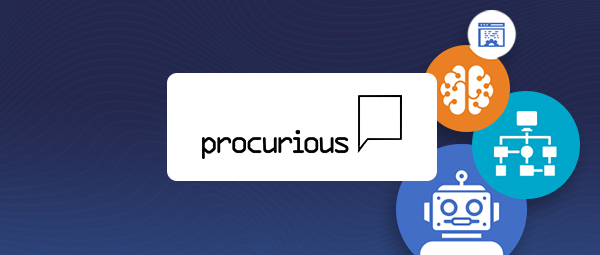Artificial Intelligence (AI) has revolutionized numerous industries, and procurement is no exception. As organizations strive to streamline their sourcing and procurement processes, AI technologies are gaining prominence for their ability to enhance efficiency, accuracy, and decision-making.
In this article, we delve into the various applications of AI in procurement, explore its benefits and challenges, and examine how organizations can harness its power to drive strategic sourcing and achieve a sustainable competitive advantage.
What Is AI in Procurement?
AI in procurement is the integration and use of AI technologies to optimize supply chain management and streamline tasks, making it a valuable asset for businesses worldwide and a key player in the future of procurement. The scope of AI in procurement ranges from automating procurement processes, increase efficiency, reducing costs, and building a competitive edge.
It is essential for businesses to consider integrating AI solutions into their procurement functions to remain competitive and operate in a rapidly changing business environment.
Four Types of Artificial Intelligence
As the integration of AI in various business applications gains momentum, the realm of Procurement is witnessing a growing number of instances where AI is being leveraged. Within Procurement functions, machine-learning algorithms play a significant role in enhancing efficiency and expediting processes.
For instance, AI is extensively employed in spend analysis, enabling automated spend classification, vendor matching, and paving the way for further advancements in this domain. The potential for AI in Procurement is vast, with exciting possibilities on the horizon, here are four popular ones:
Machine Learning
Machine learning (ML)is a subset of AI that involves training models to learn from data and make predictions or decisions without explicit programming. It relies on algorithms and statistical models to recognize patterns and improve performance over time.
In procurement, Machine Learning can extract data, optimize inventory management, automate tasks, enable predictive analytics, and support data-driven decision-making.
However, it requires quality data, may be limited by biases, and poses challenges regarding interpretability and transparency. Overall, Machine Learning is a powerful tool for enhancing efficiency and decision-making in procurement.
Deep Learning
Deep learning is a subset of machine learning and a key technology within the field of artificial intelligence (AI). It involves the use of neural networks with multiple layers to simulate the behavior of the human brain and learn from vast amounts of data.
These complex networks can automatically discover and extract intricate patterns, representations, and features from the input data, enabling them to make accurate predictions and perform sophisticated tasks. Deep learning has gained significant attention and success in various domains, including computer vision, natural language processing, and speech recognition.
In the context of procurement, deep learning holds the potential to revolutionize processes by enabling advanced analytics, intelligent decision-making, and automation of complex tasks, ultimately driving efficiency and effectiveness in procurement operations.
Natural Language Processing
Natural language processing (NLP) has emerged as a particularly powerful tool. By teaching machines to recognize and interpret human language, NLP enables procurement specialists to extract valuable insights and identify patterns within unstructured data – such as supplier contracts, invoices, and emails.
As a result, NLP can greatly enhance the speed and accuracy of procurement operations, leading to increased efficiency and cost savings for organizations.
Generative AI (Gen AI)
Generative AI, or Gen AI, has more recently emerged as one of the most powerful and significant AI technologies of our time. It is a powerful technology that facilitates the quick creation or modification of content based on a wide range of inputs. While text is the primary example in this context, Generative AI can also be applied to various other types of data, such as images, sounds, animation, 3D models, and much more. Gen AI models identify patterns and structures within existing data to generate new content.
According to Gartner, Generative AI technologies can generate newly derived versions of content, strategies, designs, and methods by learning from large repositories of original source content.
Why do Procurement Teams Need to Leverage AI?
Data is of utmost importance in procurement and for AI. The quality and integration of data can significantly impact the success of sourcing, contracting , and P2P processes, differentiating between a seamless, efficient experience and a disjointed and potentially disruptive one. While AI-powered procurement software holds great potential, it heavily relies on precise and dependable data.
From automating routine tasks to analyzing data at lightning speed, AI can provide valuable insights and help teams make informed decisions. Leveraging the power and efficiency of artificial intelligence in procurement can be a game-changer for those looking to gain a competitive edge and build the next gen procurement team.
From automating routine tasks to providing valuable insights and analytics, AI offers significant benefits to procurement teams.
By harnessing the power of AI in procurement, organizations can reduce costs, increase efficiency, and drive better outcomes across the entire procurement process. As AI continues to develop and evolve, it’s becoming clear that it has the potential to revolutionize the way we think about procurement and supply chain management.
How is AI Used in Procurement?: Real-World Examples & Use-Cases
Category Management: Category management is a complex practice that involves a varying set of information, actions and strategy. AI can be an excellent assistant in researching, identifying trends / impacts, communicating and gathering relevant information and insights, in order to put in place a strong category strategy and action plans.
Contract Lifecycle Management (CLM): The use of AI in CLM tools can significantly enhance the efficiency of processing and reviewing contracts. AI can perform the task of digitizing contracts, extracting the key information and data from them such as key terms, clauses, obligations.
With machine learning, CLM users can also find similar clauses and score contracts in terms of clause risk and contract risk based on the type of language. The result is reduced cycle times and an optimised drafting, review, negotiation and approval processes.
With advancements in AI technology, professionals in procurement and legal can now benefit from utilizing these tools to automate and improve their contract management processes.
Accounts Payable (AP): AP automation utilizing AI and machine learning has revolutionized invoice processing and payment. Capturing and extracting the right data from an invoice, matching it, allocating the costs correctly, and streamlining the processing and approval stages for invoices, businesses are seeing faster and more efficient results. With reduced human touches per invoice, errors are minimized and compliance is built in.
The integration of artificial intelligence in AP automation greatly reduces costs, making it a vital tool for businesses looking to optimize their financial processes. With all these benefits, it’s no wonder why many companies are turning to AP automation as a solution to increase efficiency and accuracy in their invoicing processes.
Read more: Transforming Procurement with Generative AI: A Practical Approach
Accelerating Adoption of Generative AI
Artificial intelligence has emerged as a game-changer in the procurement function, making significant strides in transforming the Source-to-Pay process. The potential of Generative Ai in Procurement to impact procurement cannot be overstated, as it offers CPOs a powerful tool for enhancing efficiency, trimming costs, and improving decision-making processes.
It is crucial to note that AI is not a threat to jobs, but rather a valuable collaborator that frees up human professionals to focus on strategic tasks that require creativity, critical thinking, and sound judgment. Hence, AI plays a critical role in ensuring that human expertise is utilized where it is most impactful.
As more organizations adopt AI in procurement, it is safe to say that artificial intelligence is rapidly changing the face of procurement, enabling organizations to drive value, reduce risk, and gain a competitive edge.
Read more: Accelerating Adoption of Generative AI in Procurement
What is the Future of AI in Procurement?
As we continue to take strides towards a more innovative and efficient future, it’s essential to explore the potential of AI and its ability to optimize supply chain management and streamline time-consuming tasks.
From predictive analytics to robotic process automation, the future of AI in procurement spans across an array of groundbreaking technology making it an increasingly valuable asset for businesses worldwide.
As industries look towards adopting more advanced technological solutions, AI is sure to play an important role in the future of procurement, driving cost-savings and value generation.
What’s next for AI? Check out Ivalua’s latest and greatest tool–IVA (Intelligent Virtual Assistant) Powered by Gen AI




